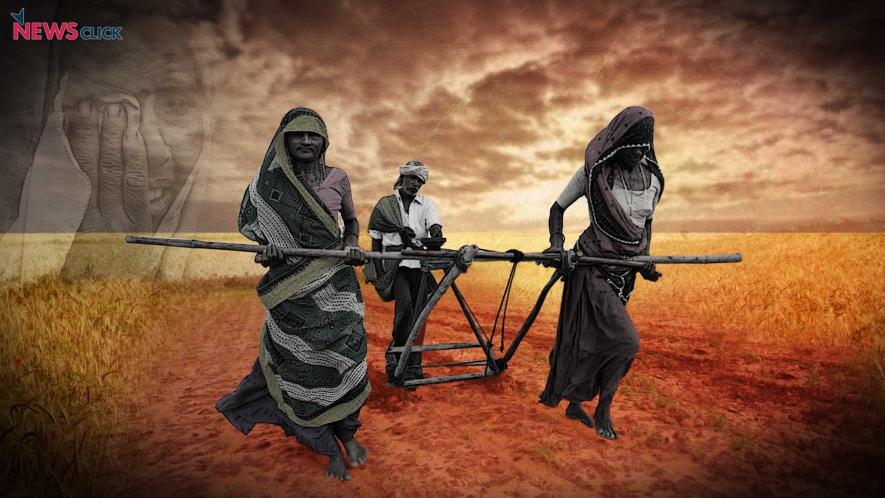Lives of Peasants in India #5

Newsclick Image by Nitesh Kumar
The year 2017 saw an outpouring of farmers’ protests sweeping the country. To understand why they happened, NewsClick presents a series of profiles of farmers from different parts of India, based on interviews done by students from Delhi, guided by the Society for Social & Economic Research (SSER). See Introduction to series.
Shanti is a farmer from Narauli, a village in Mushahari Block of Muzzafarpur district in Bihar. She is 70 years old and, besides farming, has to work as agricultural labourer on fields of others. Her husband, a few years older than her, used to be a rickshaw-puller but is now too weak to work. Shanti and her husband are both illiterate but Shanti has learnt to write her name. She has four sons. The eldest son works as a painter while his wife does the housework and manages cattle. Shanti's two sons, twins aged 27 years, work as daily labourers in Delhi. The youngest son, aged 22 years, is currently studying in college. Shanti has two grand-daughters and two grandsons.
Narauli is a large village. As per the 2011 Census, it had 1083 households and a total population of 5157. Muzzafarpur, the nearest town, is approximately 14 km away. Shanti's family owns a small house but has no crop land of their own. For the last two years they have leased 0.17 acres of land for which they have to pay an annual rent of Rs. 3500. They cultivate paddy on this land in the kharif season and, maize and coriander in the rabi season, using a hired pumpset for irrigation.
In the last rabi season (Nov 2016 to April 2017), the land produced six quintals of maize, of which two quintals were kept for self-consumption and the rest was sold to the village merchant. They also got 40 kg of coriander leaves, plucked from time to time and sold in the village itself at an average rate of Rs. 10 per kg. The family bought farm yard manure, DAP and urea in small quantities for their land. They bought maize seeds for Rs. 700. Over the whole season, they irrigated the land 18 times, spending a total of Rs. 1980 on the pump set and diesel. All the work on this tiny landholding was done using family labour and no workers were hired. Despite saving the labour costs, they could barely recover paid out expenses in the rabi season. While they made a tiny profit of Rs. 1145 from maize, they suffered a loss of Rs.700 from coriander cultivation.
In June 2017, they started preparing the land for paddy cultivation. For Rs. 300 they hired a tractor for land preparation. They bought seeds for Rs. 500, and manure and urea for Rs. 900. In the early part of the season, they needed to water the fields twice, for which they spent Rs. 220. All this expenditure went in vain as the crop was destroyed by floods soon after. They received no compensation from government, or from any insurance agency, for the crop loss. In all, they did not recover even the paid out expenditure in paddy and they incurred a loss of Rs. 3670. The loss is much greater if one values the family labour that went into paddy cultivation.
Looking at their farm accounts for the whole year, we find that the family incurred losses in agriculture. The household has primarily survived on the wage income of Shanti and her eldest son working in Muzzafarpur. Shanti works as an agricultural worker and gets Rs. 110 for each day that she finds work.
Given their very low incomes, the family had to borrow Rs. 15,000 in October 2016 from an informal savings group at an interest rate of 2 per cent per month. Although the family has repaid Rs. 5000 over the last year, but accounting for the accumulated interest, they still have an outstanding debt of about Rs. 13500.
During demonetisation last year, the family had no notes to deposit. Shanti has a Jan Dhan bank account but she has no money to keep in it. They had no access to new notes until March, 2017 and had to buy everything on credit. The local shopkeeper gave them food items and other consumables on credit. The family had to visit a doctor during that time and even the doctor's fee had to be paid later. Shanti managed to clear these debts only when her sons sent some money from Delhi.
Ankur Verma is a research scholar at Jawaharlal Nehru University, New Delhi.
Part 1 of the series can be read here.
Part 2 of the series can be read here.
Part 3 of the series can be read here
Part 4 of the series can be read here
Disclaimer: The views expressed here are the author's personal views, and do not necessarily represent the views of Newsclick.
Get the latest reports & analysis with people's perspective on Protests, movements & deep analytical videos, discussions of the current affairs in your Telegram app. Subscribe to NewsClick's Telegram channel & get Real-Time updates on stories, as they get published on our website.
























